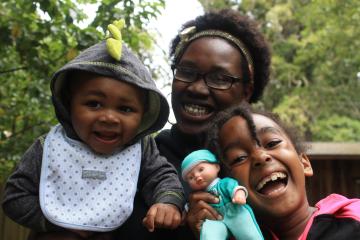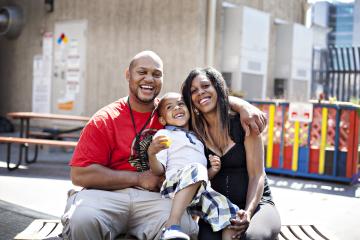
Beyond the Incubator: Building a community of practice

The Bay Area Evaluation (BAE) Incubator supported Bay Area service providers with designing and implementing cash transfer programs to assess their impact on homelessness and housing stability. Part one of our BAE Incubator partner series demonstrated the need for this important work. Subsequent blog posts showcase the experiences of BAE partners, such as Compass Family Services, Abode Services, and Hamilton Families. We now move beyond the Incubator to discuss our BAE Community of Practice.
Evidence-based policy solutions are key to addressing the housing crisis in the San Francisco Bay Area. That’s why J-PAL North America is building a community of researchers and Bay Area service providers running and evaluating cash transfer programs to foster housing stability. This community of practice is cultivating peer learning to improve programs, strengthen evaluations, and maximize impacts for communities through rigorous research and storytelling.
Building a community of practice for service providers and researchers
In 2021, J-PAL North America launched the Bay Area Evaluation (BAE) Incubator to assist organizations with designing evaluations of their cash transfer programs, eventually resulting in the launch of three randomized evaluations in the San Francisco Bay Area.
In 2023, we established the BAE Community of Practice to provide partners and researchers with a place to learn from peers engaged in similar work under a shared mission of reducing homelessness in the San Francisco Bay Area. The seven organizations involved in the community of practice—Abode Services, Bay Area Community Services, Compass Family Services, Hamilton Families, Larkin Street Youth Services, Miracle Messages, and Si Se Puede! Collective—are all conducting ongoing evaluations of cash transfer programs as a possible solution to housing instability. J-PAL North America facilitates a quarterly call with the community of practice to discuss project updates, common challenges, and solutions, share research resources and upcoming conferences, and provide expertise on communications campaigns for organizations conducting impact evaluations.
Fostering peer learning
Unconditional cash transfers, or providing people with money without prerequisites, are a promising yet disputed policy area. While there is much research on their effectiveness in low- and middle-income contexts, evidence in the United States is somewhat mixed and there is limited data on their effectiveness on housing stability.
Due to their relative novelty as a solution to homelessness, there is much to learn about how to both implement and evaluate these programs. For example, cash payments to low-income individuals can affect recipients’ eligibility for other essential welfare benefits such as Temporary Assistance for Needy Families (TANF), Supplemental Nutrition Assistance Program (SNAP), Supplemental Security Income (SSI), and more. Many pilots therefore seek out legislative change or benefit waivers, which exempt payments from being counted as income for benefit calculations, to reduce the negative impact of cash transfers on other support programs.
Another common challenge is that the inherent flexibility of unconditional cash means that it can affect recipients’ lives in a number of ways. This versatility can make it difficult to select outcomes to measure and to choose the best measurement methods. Through the community of practice, participants have a space to share their respective measurement considerations, strategies, and tools.
Finally, BAE partners are committed to sharing what they’re working on both within and beyond the community of practice. However, discussing cash transfers in the media can be challenging given increasing policy barriers. Even the decision of what to name a program (e.g., “basic income” or “guaranteed income”) can be consequential. In light of this challenge, we have facilitated a space for partners to share their experiences communicating about their pilots—both reporting data and telling stories. Sharing this work is critical in creating evidence-informed policies and practices that increase housing stability.
The Bay Area Evaluation (BAE) community of practice is committed to supporting rigorously designed evaluations; implementing thoughtful, constituent-centered programs; sharing knowledge and stories; and informing housing policy in the San Francisco Bay Area and beyond.
Stay up to date
We encourage you to read more about the preliminary work of some of our partners in the community: a November 2023 preliminary results report from the Miracle Money program and a website launched in May 2024 from the Bay Area Thriving Families study.
If you’re interested in learning more about this engagement, please contact Amanda Lee, Senior Research Manager at J-PAL North America. If you would like to receive updates on our work in the San Francisco Bay Area as well as other projects, subscribe to our Addressing Homelessness and Housing Stability newsletter.
Related Content

BAE Incubator partner series, part two: Compass Family Services on taking evaluation to the next level

BAE Incubator partner series, part three: Abode Services on rigorous evaluation and elevating community voices


